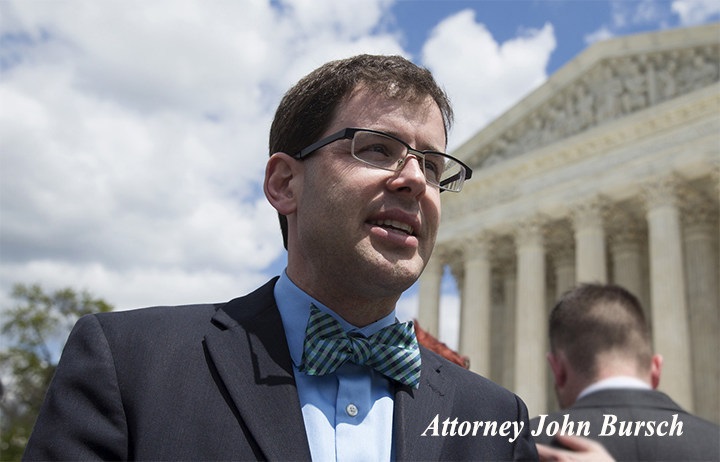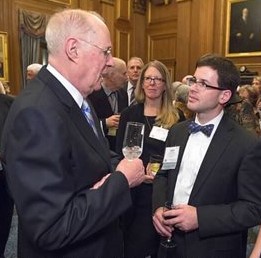UNITED STATES SUPREME COURT EXPERIENCE
John has argued 13 cases in the United States Supreme Court since 2011, more than all but a handful of private attorneys nationwide during that period. His Supreme Court briefs have earned three Best Brief Awards from the National Association of Attorneys General, one for each of the three years he served as Michigan Solicitor General. A recent study of the Court's 2012-15 Terms concluded that John's cert. petitions had one of the highest grant rates in the country. Another recent study on "clutch" Supreme Court practitioners included John in its "veritable who's who of Supreme Court litigators" list, and yet another recognized John as having the 3rd highest success rate for persuading Justices to adopt his legal position among frequent Supreme Court advocates who did not work for the federal government.
The subject matter of John's Supreme Court cases has ranged from constitutional questions to telecommunications law to intellectual property. In the 17 merits decisions he has received - 14 following oral argument (including two that John briefed but a colleague argued) and three as summary decisions - his client has prevailed ouright in 12 and obtained partial relief in two more, compiling a record that the National Law Journal observed "even more veteran high court advocates would envy."
U.S. Supreme Court merits decisions
- Medina v. Planned Parenthood, ___ S. Ct. ___ (2025) (whether the Medicaid Act's any-qualified-provider provision creates a private right enforceable under Section 1983; argued for Alliance Defending Freedom)
- Americans for Prosperity Foundation v. Bonta, 141 S. Ct. 2373 (2021) (successfully invalidating California Attorney General's compelled-donor-disclosure rule for nonprofits soliciting in the State; principal draftsperson for Alliance Defending Freedom on behalf of the Thomas More Law Center)
- Uzuegbunam v. Preczewski, 141 S. Ct. 792 (2021) (persuaded Court to hold that a nominal-damages request satisfies the redressability element necessary for Article III standing where a plaintiff's claim is based on a completed violation of a legal right; principal draftsperson for Alliance Defending Freedom)
- Harris Funeral Homes v. EEOC, 140 S. Ct. 1731 (2020) (whether Title VII's prohibition on discrimination because of "sex" includes differential treatment based on orientation or gender identity; argued for Alliance Defending Freedom)
- Lee v. United States, 137 S. Ct. 1958 (2017) (defendant can demonstrate Strickland prejudice when his lawyer misadvises him about the deportation consequences of a plea)
- Star Athletica, LLC v. Varsity Brands, Inc., 137 S. Ct. 1002 (2017) (establishing the appropriate test for determining when a feature of a useful article is protectable under the Copyright Act)
- Hickenlooper v. Kerr, 135 S. Ct. 2927 (2015) (assisted Colorado in obtaining summary vacation of adverse circuit court opinion in case involving validity of a so-called Taxpayers' Bill of Rights)
- Obergefell v. Hodges, 135 S. Ct. 2584 (2015) (argued on behalf of State of Michigan in defending its constitutional definition of marriage)
- Michigan v. Bay Mills Indian Community, 134 S. Ct. 2024 (2014) (granting client the ability to file Ex Parte Young-type actions against tribal officials to circumvent trival immunity)
- Schuette v. Coalition to Defend, 134 S. Ct. 1623 (2014) (upholding Michigan's constitutional ban on discrimination or the use of race- or sex-based factors in public-university admissions)
- Burt v. Titlow, 134 S. Ct. 10 (2013) (reinstating murder conviction based on habeas petitioner's failure to satisfy the burden of proof under the Antiterrorism and Effective Death Penalty Act)
- McQuiggin v. Perkins, 133 S. Ct. 1924 (2013) (reversing Sixth Circuit and emphasizing the high bar to proving actual innocence for purpose of a time-barred habeas claim)
- Metrish v. Lancaster, 133 S. Ct. 1781 (2013) (reinstating murder conviction and holding that a Michigan Supreme Court change in common law could be applied retroactively)
- Lafler v. Cooper, 132 S. Ct. 1376 (2012) (affirming defendant's Sixth Amendment right to effective counsel at the plea stage but rejecting a new-trial remedy and authorizing trial courts to refuse a convicted defendant's ability to accept a previously rejected plea)
- Howes v. Walker, 132 S. Ct. 2741 (2012) (summary reversal of Sixth Circuit decision vacating murder conviction)
- Howes v. Fields, 132 S. Ct. 1181 (2012) (reinstating sexual-assault conviction and holding that a prisoner was not "in custody" for purposes of a Miranda warning)
- Stovall v. Miller, 132 S. Ct. 573 (2011) (summary reversal of Sixth Circuit decision vacating murder conviction)
- Talk America v. Michigan Bell Telephone Co., 131 S. Ct. 2254 (2011) (reversing Sixth Circuit and holding that competitive local exchange carriers, or CLECs, are entitled to regulated rates when engaged in interconnection with customers of incumbent local exchange carriers, or ILECs)



